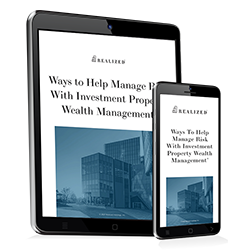%20risk%3F-1192866996.jpg?width=750&height=392&name=What%20is%20duration%20(horizon)%20risk%3F-1192866996.jpg)
Many investors turn to real estate investment trusts (REITs) for portfolio diversification, dividend income, and potential long-term appreciation of their initial investment capital.
Like any other investment, though, REITs carry risk. Although recurring dividend income has been a primary attraction for investors – especially for funding and supplementing retirement income – there always remains the possibility that REITs won’t be able to return dividends to investors. In this article we’ll take a look at how REITs work and take a closer look at REIT dividend risk.
How REITs Work
REITs occupy a unique place as investment vehicles. REITs are formed for the sole purpose of owning, operating, and acquiring commercial real estate. Investors can purchase shares of publicly traded real estate investment trusts just like buying any other type of stock, but REITs don’t operate like other dividend-paying stocks.
In order to be classified as a REIT, the organization must return 90 percent or more of its taxable income back to investors as dividends, although REITs often pay out 100 percent of their taxable income to shareholders so they won’t have to pay any corporate income tax.
A few additional qualifications REITs must meet include:
- Have a minimum of 100 shareholders within its first year, with no more than half of the total shares held by five or fewer investors
- Invest the bulk of total assets (no less than 75 percent) in real estate
- Derive no less than 75 percent of gross income from rent, mortgage interest, or the sale of real property
REITs are not taxed on gross income – that burden falls to REIT shareholders when they receive dividend payments. The bulk of REIT income comes from tenant lease payments and asset divestiture, but REIT dividends are taxed in three different ways.
REIT Dividend Risk
A number of factors could impact a REIT’s ability to return dividends to shareholders.
Publicly traded REITs have the same risks as other stock market investments – share prices can mirror broader declines in public equities markets. REITs also are subject to leverage and liquidity risk that could affect dividend distributions.
REITs often focus on one sector of commercial real estate, such as hospitality, multifamily, retail centers, or healthcare facilities. The overall strength of these sectors can be adversely affected by a variety of economic and market forces, which could affect a REIT’s cash flow.
Lastly, non-traded and private REITs are illiquid investments that will tie up your investment funds for a predetermined length of time. There’s no guarantee private or non-traded REITs will be able to make regularly scheduled dividend payments to investors. While dividends distributions typically come from cash flow from operations, they also can come from asset divestiture and other investor’s equity, which dilutes the strength of individual investor’s interests.
The Bottom Line
Investing in REITs can help investors diversify their portfolios, manage market volatility, and provide a potential source of recurring income through dividend distributions. Property-based REITs derive the bulk of their income from lease payments from tenants in a wide range of commercial real estate properties. However, illiquidity, leverage, market volatility, sensitivity to rising interest rates, and other factors can adversely affect a REITs ability to make regular dividend payments to investors.
This material is for general information and educational purposes only. Information is based on data gathered from what we believe are reliable sources. It is not guaranteed as to accuracy, does not purport to be complete and is not intended to be used as a primary basis for investment decisions. It should also not be construed as advice meeting the particular investment needs of any investor. Consult with your tax advisor regarding your individual circumstances. Realized does not provide tax or legal advice. This material is not a substitute for seeking the advice of a qualified professional for your individual situation. All investments have an inherent level of risk. The value of your investment will fluctuate with the value of the underlying investments. You could receive back less than you initially invested and there is no guarantee that you will receive any income. There is no guarantee that companies that can issue dividends will declare, continue to pay, or increase dividends. A REIT is a security that sells like a stock on the major exchanges and invests in real estate directly, either through properties or mortgages. REITs receive special tax considerations and typically offer investors high yields, as well as a highly liquid method of investing in real estate. There are risks associated with these types of investments and include but are not limited to the following: Typically no secondary market exists for the security listed above. Potential difficulty discerning between routine interest payments and principal repayment. Redemption price of a REIT may be worth more or less than the original price paid. Value of the shares in the trust will fluctuate with the portfolio of underlying real estate. Involves risks such as refinancing in the real estate industry, interest rates, availability of mortgage funds, operating expenses, cost of insurance, lease terminations, potential economic and regulatory changes. This is neither an offer to sell nor a solicitation or an offer to buy the securities described herein. The offering is made only by the Prospectus.



